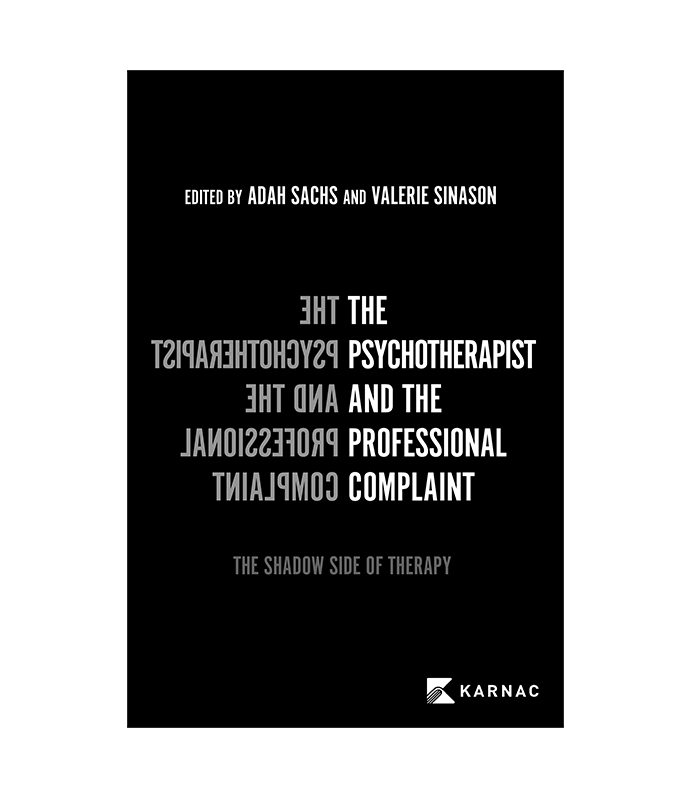The patient’s word was once easily dismissed against the word of the psychiatrist, doctor or therapist, leaving the patient vulnerable. Recognising this inherent risk in the relationship between clinicians and patients, professional regulations have gradually been established to facilitate patients’ access to information, support and recourse. However, while most professions also explicitly protect their own members, there are, notably, no systems in place to protect psychotherapists. The current complaint procedure presumes the therapist’s guilt until proven innocent, rather than the reverse.
The Psychotherapist and the Professional Complaint explores this problem with sensitivity and rigour. In these chapters, the contributors examine ways to address serious conflicts in the psychotherapy relationship and the role of professional bodies in protecting their members while regulating their performance. Acknowledging both strengths and flaws, they outline the historical context and future prospects of the current complaint procedures. This book invites us to think and speak on the controversial subject of complaints, supporting patients, therapists and policymakers alike.





 Adah Sachs has worked for many years as a psychotherapist in psychiatric hospitals, first at St Clements (the Royal London Hospital) and then at Huntercombe Manor, a special hospital for adolescents. She is a visiting lecturer and a training supervisor at the Centre for Child Mental Health and at the Centre for Attachment-based Psychoanalytic Psychotherapy, as well as in her private practice.
Adah Sachs has worked for many years as a psychotherapist in psychiatric hospitals, first at St Clements (the Royal London Hospital) and then at Huntercombe Manor, a special hospital for adolescents. She is a visiting lecturer and a training supervisor at the Centre for Child Mental Health and at the Centre for Attachment-based Psychoanalytic Psychotherapy, as well as in her private practice. Valerie Sinason is a poet, writer, child psychotherapist and adult psychoanalyst. She is Founder Director of the Clinic for Dissociative Studies and President of the Institute for Psychotherapy. She is an Honorary Consultant Psychotherapist at the University of Cape Town Child Guidance Clinic and Chair of Trustees of the First People Centre, New Bethesda, South Africa. She is a Patron of Dorset Action on Abuse (DAA), editor of Trauma Dissociation and Multiplicity and co-editor of Psychoanalytic Psychotherapy after Child abuse. She has published numerous articles and books, including two poetry collections. Valerie Sinason was awarded a Lifetime Achievement Award from the ISSTD (International Society for the Study of Trauma and Dissociation) in April 2016.
Valerie Sinason is a poet, writer, child psychotherapist and adult psychoanalyst. She is Founder Director of the Clinic for Dissociative Studies and President of the Institute for Psychotherapy. She is an Honorary Consultant Psychotherapist at the University of Cape Town Child Guidance Clinic and Chair of Trustees of the First People Centre, New Bethesda, South Africa. She is a Patron of Dorset Action on Abuse (DAA), editor of Trauma Dissociation and Multiplicity and co-editor of Psychoanalytic Psychotherapy after Child abuse. She has published numerous articles and books, including two poetry collections. Valerie Sinason was awarded a Lifetime Achievement Award from the ISSTD (International Society for the Study of Trauma and Dissociation) in April 2016.
Professor Ann Casement, LP, past chair, United Kingdom Council of Psychotherapy (UKCP) –
‘This outstanding book is an update on where the mental health profession’s complaints system is now. Its timely analysis follows in the wake of prior work on reform, which include the attempt in 2001 at the House of Lords to statutorily regulate psychotherapists in the UK (Alderdice, Casement et al.).’
Professor Sheila the Baroness Hollins, former president, Royal College of Psychiatry; former president, the British Medical Association (BMA) –
‘Patients who feel hurt, or even abused and exploited by their treatment, need a place to be heard and for appropriate action to follow. Therapists who have been complained about also need a place where they can be heard. All too often accrediting bodies try to be both a protector and a prosecutor. This engaging and authoritative book draws together thoughtful contributions from barristers, NHS psychiatrists, union members, and therapists who have been complained about, and seriously questions whether complaints processes are currently adequate to the task.’
Aimee Dexter –
‘This book is not about criminal exploitation and abuse of patients, which requires the law rather than a complaint system. Rather, it is about what happens when something goes wrong in the therapist–patient relationship, or some past trauma cannot be resolved or tolerated and how these situations can increasingly lead to a complaint. What happens then? A complaint is something many psychotherapists and counsellors are ill equipped to understand or face. In this book, psychotherapists, psychiatrists, and barristers ask if the system is fit for purpose. It is timely for it to be here with us when so many people now turn to complaints.’
Dr Pat Frankish, consultant clinical psychologist and psychotherapist; former president, British Psychological Society (BPS) –
‘This book is not about criminal exploitation and abuse of patients, which requires the law rather than a complaint system. Rather, it is about what happens when something goeswrong in the therapist–patient relationship, or some past trauma cannot be resolved or
tolerated and how these situations can increasingly lead to a complaint. What happens then? A complaint is something many psychotherapists and counsellors are ill equipped to understand or face. In this book, psychotherapists, psychiatrists, and barristers ask if the system is fit for purpose. It is timely for it to be here with us when so many people now turn
to complaints.’